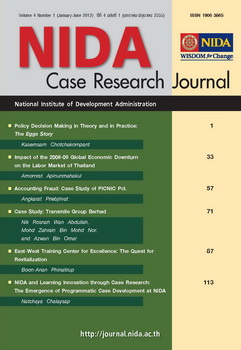Impact of the 2008-09 Global Economic Downturn on the Labor Market of Thailand
Keywords:
Employment Opportunity, Informal Worker, Workers in Rural and Urban AreasAbstract
Starting in 2008, a sequence of crises hit the world economy and East Asian. Thailand was not spared. The country experienced a massive increase in food and fuel price resulting in an increase in the cost of living to all households. Those in rural area were more affected than their counterparts in urban area due to the fact that food consumption held a substantial share in rural CPI basket. To maintain the family standard of living, other family members in particular women had to participate in labour market. Female labour force participation in rural area increased by 2.5 percentage points from 2007 to 2009.
Along with the harmful impact of high inflation, the U.S. financial crisis arrived Thailand towards the end of 2008. The growth rate of real GDP began to decline from the second half of 2008 and contracted for most of the 2009 period. The demand for workers in export sector reduced subsequently. Yet the impact was more severe and happened earlier for men than women.
The real wage for both women and men in rural area declined between 2007 and 2009 as a result of an accelerate increase in food and fuel prices. Again men experienced a decline in their real wage larger than that of women. Overall, the monthly real wage in rural areas decreased while it increased by roughly 9% in urban areas. Workers in rural area, therefore, were more affected by the economic downturn in 2008 than in 2009. Wage workers also experienced hour works reduction during the recession. In 2008, men in all work statuses were more affected than women. Though their situation improved later in 2009, it happened only in the informal sector.
For the employment opportunities, the number of informal workers in particular unpaid family workers increased at a rate higher than wage workers. Once the financial crisis developed its full blow in 2009, it was only non-wage sector that continued to grow while the wage sector contracted.
Concerned with the economic development of the country as well as the upcoming 2011 general election, Prime Minister Abhisit Vejjajiva was afraid that the widening gap between the rural poor and the urban elites not only hindered the poverty reduction affords of his government with regard to various policy response to the crises, but also could have a profound influence on the outcome of general election that he intended to call upon at some point in 2011. He, therefore, needed to know that which social groups were most affected by the global crises, and whether any additional measures were necessary to better shelter them.





